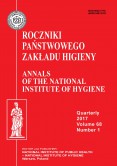Rocz Panstw Zakl Hig 2023, 74(2): 231-241
Benzene health risk assessment for neurological disorders of gas station employees in Rayong Province, Thailand
[Benzene health risk assessment for neurological disorders of gas station employees in Rayong Province, Thailand]
ABSTRACT
Background. The main job of employees working in the area of fuel service stations is to provide refueling services to customers. Therefore, operators at petrol stations may be exposed to chemicals for long periods, potentially affecting their health in nervous system.
Objectives. This study aims to assess the risk of benzene exposure to the nervous system in gas station operators. Data were collected from 100 fuel service personnel working at fuel dispensers and 100 employees working outside fuel dispensers, accounting to 200 cases.
Material and methods. Data were collected using interview questionnaires. Urine samples were used for the analysis of t,t-muconic acid.
Results. The results showed that t,t-muconic acid concentration is 431.23 ± 233.69 μg/g.cr (449.28 ± 213.32 μg/g.cr at fuel dispensers vs 413.18 ± 252.20 μg/g.cr outside fuel dispensers). The risk characterization results showed that most of the risks were at level 1 (low risk), as observed in 108 people (54.0%). The results of the analysis of the relationship between t,t-muconic acid concentrations classified by 3 levels of percentile and neurological disorders of the study group, the results showed that there was a statistically significant relationship (p-value <0.05).
Conclusion. Therefore, the benzene neurotoxic risk assessment model could be utilized in field practice.
Downloads: 697


